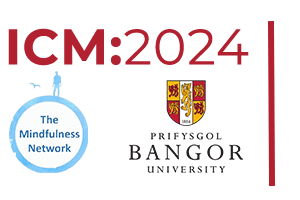political, environmental, and global initiatives
How can we turn mindfulness into action – personally, politically and socially?
Mindfulness has the potential to make a significant impact in our world at a time when we are facing multiple challenges. But for this to be realised, we all need to step up to meet the current issues of our time. We need to engage with policymakers, politicians, and influencers to establish sustainable and structured frameworks for mindfulness to thrive. As we draw the conference to a close, this strand will support us to reflect deeply about how each of us can make a difference and move forward with the work that is needed. We’ll consider our own unique contexts, life experience and skills that enable us to play a part in the bigger whole.
The strand includes, but is not limited to:
- Future Generations Act in Wales
- Mindfulness and the interface with politics
- Meditation practice and environmental/political attitudes and behaviour
- Eco-anxiety
Effects of climate change on individuals and society - Mindfulness and sustainability
- Mindfulness and consumer behaviours?
Strand 5 begins with a Keynote from Jamie Bristow that incorporated a Panel and audience discussion. After this you can choose to attend either: a workshop, research symposium, or guided practice, which will be held across various spaces in Bangor University’s Pontio Centre. Strand 5’s closing Keynote is presented virtually with Jon Kabat-Zinn.
keynote and panel
Agency and Connection in the Polycrisis: Mindfulness as a Foundational Capacity for Societal Transformation with Jamie Bristow
Society is experiencing profound, interrelated shocks from rapid cultural, technological and environmental change. These shocks exacerbate each other, creating a complex and challenging environment for individuals, communities and governments to navigate - a predicament increasingly described as ‘the polycrisis’. In this fraught context, our collective agency – our ability to make sense of the world, make decisions and act together in pursuit of common goals - becomes compromised. Meanwhile, the disconnection that has characterised Modernity - disconnection from ourselves, each other and nature - is further exacerbated, degrading resilience and collaboration. Reinforcing our collective agency and connectedness is a political challenge - how do we organise, find common purpose and build institutions fit for purpose? But it is also an inner challenge - a matter of our individual and collective capacities, our culture, and our fundamental relationship with the natural world. Mindfulness, as an innate capacity that’s amongst the most foundational and transformative for both our agency and ability to connect, has a key role to play.
Drawing on ground-breaking reports published by The Mindfulness Initiative, ‘Reconnection: Meeting the Climate Crisis Inside Out’ and ‘Mindfulness: Developing Agency in Urgent Times’, in this session Jamie Bristow will lay out a narrative framework and supportive evidence for how mindfulness practice can be understood as most profoundly a training in human agency and conscious connection, and why mindfulness should be considered a foundational capacity for the 21st Century.
Jamie’s keynote presentation will be followed by audience discussion and a panel of respondents who will bring different perspectives on its implications. Cathy-Mae Karelse (EDI Lead for The Mindfulness Initiative) will reflect on the implications for communities, activism and social justice, whilst Roy Ellis (Mindfulness Lead for the Welsh Government) will offer his view on the implications for the work of public servants, and Richard Edwards (Director of The Mindfulness Initiative) will offer comments on how innovation can include this thinking and help mindfulness approaches meet the challenges of our times.
Bristow, J., Bell, R., Wamsler, C. (2022). Reconnection: Meeting the Climate Crisis Inside Out.
Research and policy report.’ The Mindfulness Initiative and LUCSUS. www.themindfulnessinitiative.org/reconnection
Bristow, J., Bell, R., Nixon, D. (2020). Mindfulness: Developing Agency in Urgent Times. The Mindfulness Initiative. https://www.themindfulnessinitiative.org/agency-in-urgent-times/
Bristow, J. (Ed.). (2021). Responding to Mindfulness: Developing Agency in Urgent Times – A compilation of essays. The Mindfulness Initiative. https://www.themindfulnessinitiative.org/responding-to-mindfulness-developing-agency-in-urgent-times-a-compilation-of-essays
closing keynote
Closing Keynote with Jon Kabat-Zinn (Virtual Presentation)
As we draw towards the end of the conference this talk and guided inquiry will support participants in the conference to reflect on their learning and its implications. The session will support deep inquiry into the ways in which the work of teaching or researching mindfulness enables us to contribute to our world in ways that matter. We will reflect on how our mindfulness work engages with challenges at the level of the individual, the community, and the wider social and ecological system within which we are embedded. The session will support inquiry on a very personal level. What is my place in this interconnected global endeavour? What are the unique qualities, skills, contexts, and understandings that I bring? How do these personal elements enable me to develop my work in ways that contribute to the bigger whole.
workshop
Mindfulness for Life: Being the Change You’d Like to See in the World with Willem Kuyken
Hiking in the Lake District of England, I stopped for lunch in a cemetery. There was a headstone with a name and this simple inscription: “A Life Well Lived.” What does a life well lived look like? It’s a question that we’ve all asked in one form or another. It’s a question that has been asked for millennia by artists, from musicians to painters, dancers, sculptors, poets, and rappers, as well as philosophers and contemplatives…. And what does a life lived well look like for you?
Opening from Mindfulness for Life, by Willem Kuyken
The COVID-19 pandemic has made us all reflect on this question. As we emerge from the pandemic, the question of living well in the contemporary world has become a more pressing question. It is the same question that has been a driving force for the development of mindfulness-based programs.
What is mindfulness?
How can ancient wisdom and modern psychology together help us understand how distress and suffering are created and recreated? How can they help us understand how joy and well-being are created and sustained?
How does mindfulness support the path from suffering to flourishing? Is mindfulness a technique or a way of being in the world – or both? How does it enable transformation?
What would it take to reconceptualize secular mindfulness training as a transformative lifetime practice that helps people to live in the contemporary world – and more than this to shape the contemporary world in positive ways?
What are the important questions around ethics and integrity for mindfulness practitioners, teachers and the wider field? What supports this inquiry?
- What does it mean to be the change we’d like to see in the world?
Online workshop
Mindfulness Practices in Government: A case study from Wales with Diana Reynolds and Pegs Bailey.
Wales was the first country in the world to embed the United Nations Sustainable Development Goals into legislation in the Well-being of Future Generations Act (2015). In order to achieve these goals, the Welsh Government has been attempting to embed mindfulness and other aspects of the Inner Development Goals into its ways of working for many years. Diana leads the culture change service that supports this work and has received support and insights from many academics. Most notably and successfully, Rachel Lilley from Birmingham University ran a series of courses that engaged senior civil servants in experiencing, reflecting upon and using Mindfulness Based Behavioural Insights. Pegs is leading small research project to discover more about the lessons that might be drawn from the Welsh experience of implementing mindfulness training and tools. Diana and Pegs will present their latest findings, fresh and tentative, from this work and invite you to discuss them by trying out some of the micro-practices with which civil servants and others in Wales are beginning to experiment.
guided practice
A Meditation on Embodied Interdependence: Calling nature toward us and inviting her in to teach us with Margaret Fletcher.
Many students of traditional meditation have heard the instructions on meditating internally, externally and both internally and externally. Still, with all that we have to contend with in our complicated lives, these instructions can be difficult to accomplish. Attending to the whole of life, leave aside caretaking the same, sounds like a lot and is so often overshadowed by immediate demands. What happens when we attune in an embodied, self-inclusive way to the subtle arisings around, in and amongst the whole of awareness? In this practice, we will begin in awareness within our own body-mind (local awareness) then carefully, simultaneously, broadening into the widened body of our inter-being, inter-acting and inter-creating with life itself. Using sensory, attentive and creative means, we’ll experiment with calling in Nature herself to teach us. Such inclusive intimacy with the subtle and the natural leads to clear seeing, compassion, and equanimity. In attuning to the self-regulating intelligence of the planet reaching out to us, we can experience the importance of balancing mindfulness meditation with meditation on interdependence, for the sake of our own life and the one common life of planet Earth. By listening at all levels, our hearts can be liberated into action in response to what is heard, felt and known. Please note: side effects may include the release of anxiety, fear and the sense of an isolated, burdened self!
Teachers of MBIs can adopt meditation on interdependence as an easeful support for themselves and as a means for encouraging embodied awareness of interdependence to come through their teaching. The ripple effects for our students toward loosening the grip of self-isolation and inviting the Earth into our continuous, embodied knowing would be a great gift to life itself.
Learning aims:
Examine the potential of embodied interdependence as a formal practice
Engage in a guided meditation on embodied interdependence
- Assess and consider future applications for your personal practice and your life in community
Research Presentations
Here are the research sessions for Strand 5.. Each session will feature selected abstracts presented in 15-minute talks, offering a chance to hear the latest cutting-edge research in the mindfulness and compassion fields. Detailed timings will be available in the full conference programme. Full abstracts will be available on the ICM:2024 Community Portal for all registered conference attendees.
Mindfulness and the Climate (Research Group)
-
Climate distress in the student population and its association with mental health, functioning and trait mindfulness Sarah Law
-
Healing within, healing the planet: The effects of mindfulness practice and nature connectedness on climate distress and environmental action Nushka Marinova
-
What Happens in Climate Cafés?: Exploring Responses to the Psychological Burdens of Climate Change in Seven UK Women Luis Calabria
-
“An oasis in my week”: Participant experiences of a mindfulness-based Active Hope course for eco-distress Elizabeth Marks



